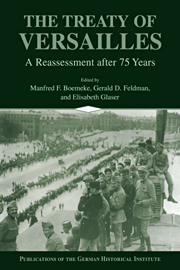Book contents
- Frontmatter
- Introduction
- Prologue: 1919-1945-1989
- PART ONE PEACE PLANNING AND THE ACTUALITIES OF THE ARMISTICE
- PART TWO THE PEACEMAKERS AND THEIR HOME FRONTS
- PART THREE THE RECONSTRUCTION OF EUROPE AND THE SETTLEMENT OF ACCOUNTS
- PART FOUR THE LEGACY AND CONSEQUENCES OF VERSAILLES
- PART FIVE ANTECEDENTS AND AFTERMATHS REFLECTIONS ON THE WAR-GUILT QUESTION AND THE SETTLEMENT
- 22 Max Weber and the Peace Treaty of Versailles
- 23 The Construction of the American Interpretation: The Pro-Treaty Version
- 24 British Revisionism
- 25 Woodrow Wilson's Image of Germany, the War-Guilt Question, and the Treaty of Versailles
- 26 A Comment
- Bibliography
- Index
26 - A Comment
from PART FIVE - ANTECEDENTS AND AFTERMATHS REFLECTIONS ON THE WAR-GUILT QUESTION AND THE SETTLEMENT
Published online by Cambridge University Press: 05 January 2013
- Frontmatter
- Introduction
- Prologue: 1919-1945-1989
- PART ONE PEACE PLANNING AND THE ACTUALITIES OF THE ARMISTICE
- PART TWO THE PEACEMAKERS AND THEIR HOME FRONTS
- PART THREE THE RECONSTRUCTION OF EUROPE AND THE SETTLEMENT OF ACCOUNTS
- PART FOUR THE LEGACY AND CONSEQUENCES OF VERSAILLES
- PART FIVE ANTECEDENTS AND AFTERMATHS REFLECTIONS ON THE WAR-GUILT QUESTION AND THE SETTLEMENT
- 22 Max Weber and the Peace Treaty of Versailles
- 23 The Construction of the American Interpretation: The Pro-Treaty Version
- 24 British Revisionism
- 25 Woodrow Wilson's Image of Germany, the War-Guilt Question, and the Treaty of Versailles
- 26 A Comment
- Bibliography
- Index
Summary
A “last word” on anything may only repeat the first word ever said about it. . . .
-A. P. Thornton, Minneapolis, 1977“A “last word” on anything may only repeat the first word ever said about it. . . .” A. P. Thornton, Minneapolis, 1977 / Before the ink had dried on the Treaty of Versailles, the movement to tinker with its terms, to renegotiate its most controversial provisions or to destroy it altogether had begun. This was hardly a novel phenomenon: those who had “lost” at Frankfurt am Main in 1871, at Paris in 1856, at Vienna in 1815, had immediately contrived to place renegotiation or revision of the peace terms at the top of the diplomatic agenda. The “winners,” the Metternichs, the Palmerstons, and the Bismarcks, would have been surprised had it been otherwise; they began to make their plans for how they would uphold the postwar political system even as they were creating it. This posture was mimicked by Woodrow Wilson, David Lloyd George, and Georges Clemenceau: they did not expect the Germans to submit without complaint to the imposition of the new order and would have been astonished had they done so. The Big Three thought they had created new rules, new techniques, new mechanisms that would uphold the integrity of the system that they had designed. It might be argued that the leaders of the Entente constituted the first wave of revisionists: those who believed that once the Germans had been disciplined and democratized that they would become a part of the system, and, becoming a part of it, could mend it to match their new morality.
- Type
- Chapter
- Information
- The Treaty of VersaillesA Reassessment after 75 Years, pp. 615 - 636Publisher: Cambridge University PressPrint publication year: 1998



